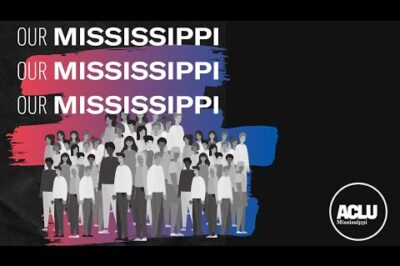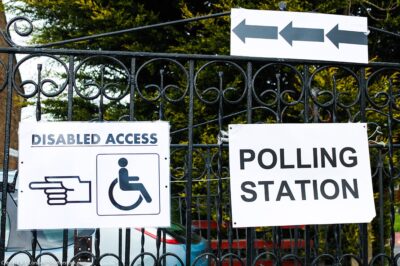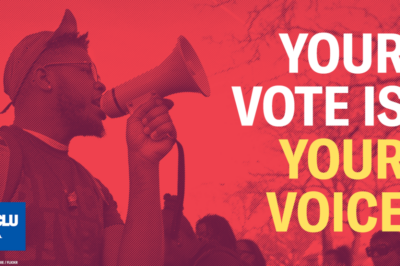ACLU Urges County Elections Supervisors to Implement a Four-Part Program to Protect the Right to Vote
FOR IMMEDIATE RELEASE
MIAMI – The American Civil Liberties Union of Florida today urged elections supervisors attending a conference this week in Key West to implement a four-part program to protect the right to vote for all Floridians during the upcoming election season.
“The integrity of the voting process is now in the hands of 67 elections supervisors who are each operating under their own set of rules,” said ACLU of Florida Executive Director Howard Simon, who will be delivering a packet of materials to supervisors at the 59th Annual FSASE Summer Conference in Key West. “As constitutional officers responsible for upholding the election laws of this state, the supervisors have the legal obligation to ensure that every eligible voter in the state of Florida is able to cast a ballot and have that vote accurately counted, and to prevent the unnecessary and unjust disenfranchisement of voters. Yet, here we are, just five months away from a major election, and people who were wrongfully purged have yet to be restored to the voter rolls, and state officials have now issued another list of voters to be purged that undoubtedly contains numerous eligible voters.”
In a follow-up letter distributed today, Simon urged elections supervisors to:
- Independently verify both the identity and the record of a felony conviction for any potential match transmitted through the felon matching component of the state’s Central Voter Database and to verify both the identity and the felony conviction prior to sending certified mail notifying the person of his or her potential ineligibility to vote.
- Instruct all poll workers to give a voter marked as ineligible a provisional ballot only if the poll worker has determined with certainty that the person is, in fact, in his or her correct precinct. Because provisional ballots cast by voters in incorrect precincts will not be counted, the ACLU is urging supervisors to instruct poll workers to refrain from giving an individual who is not in his or her correct precinct a provisional ballot and to instead direct the voter to his or her proper polling place.
- Instruct all poll workers that no voter be turned away from the polls solely for failure to provide photo and signature identification unless the person is a first-time voter who registered by mail and did not provide the required identification to the Supervisor of Elections prior to Election Day.
- Seek – as soon as possible – the advice of an independent expert concerning how counties can test the functionality of their voting machines prior to Election Day, and how counties can routinely audit each election in order to reveal anomalies that may occur in vote recording and tabulation.
The text of today’s letter to all county elections supervisors follows.
To read the ACLU’s May 14 letter to elections supervisors, visit: http://www.aclufl.org/news_events/index.cfm?action=viewRelease&emailAlertID=153
June 7, 2004
Dear County Supervisor of Elections:
This is a follow-up letter to our earlier communication of May 14, 2004. (A copy of which is enclosed.)
As you meet in Key West for your 59th Annual FSASE Summer Conference, we ask you to take action to protect the right to vote in several crucial areas.
Felon Matching Component of the Central Voter Database (CVD):
- We urge you to fulfill your legal responsibility to independently verify both the identity and the record of a felony conviction for any potential match transmitted to you through the felon matching component of the CVD and to verify both the identity and the felony conviction prior to sending certified mail notifying the person of his or her potential ineligibility.
- If there is any doubt about the identity or the accuracy of the felony record, we urge you to not remove any voter from the voter rolls unless you have actual hard copy verification of the felony conviction of the person whose name appears on the voter rolls.
We remind you of the representations by Florida’s Attorney General in seeking preclearance of the 2001 Election Reform statutes by the U.S. Department of Justice at which time Attorney General Robert Butterworth unequivocally represented that a non-responding voter would not be purged unless the Supervisor of Elections actually made an affirmative determination, based on information other than the CVD, that the voter was in fact ineligible to vote.
(See June 3, 2004 letter FSASE president Supervisor Kay Clem and Director of the State Division of Elections Edward C. Kast, attached in .pdf format.)
Provisional balloting:
- We urge you to instruct all poll workers to give a voter marked as ineligible a provisional ballot only if the poll worker has determined with certainty that the person is in fact in his or her correct precinct. We urge you to instruct poll workers to refrain from giving an individual who is not in his or her correct precinct a provisional ballot and to instead direct the voter to his or her proper polling place.
These instructions to poll workers should not only be included in any written poll worker training materials, but should also be emphasized repeatedly in poll worker trainings.
This step is necessary in order to protect the right to vote for otherwise eligible voters in light of Florida law, which states, “If it is determined that the person voting the provisional ballot was not registered or entitled to vote at the precinct where the person cast a vote in the election, the provisional ballot shall not be counted and the ballot shall remain in the envelope containing the Provisional Ballot Voter’s Certificate and Affirmation and the envelope shall be marked ‘Rejected as Illegal’.” (Florida Statute 101.048).
Voter Identification Requirement:
- We urge you to instruct all poll workers that no voter be turned away from the polls solely for failure to provide photo and signature identification.
The only exception to this rule is for first-time voters who registered by mail and did not provide the required identification to the Supervisor of Elections prior to election-day. For all other voters who fail to provide proper identification at the polls, poll workers should be instructed to ask such individuals to sign an affidavit verifying their name and address, as outlined in Florida Statute 101.043(2), and then such persons should be allowed to vote normally. Poll workers should be instructed NOT to give such voters a provisional ballot.
- We urge you to clearly identify in the county-wide voter database available at each polling place any first-time voters who registered by mail and did not provide ID to the Supervisor of Elections prior to Election Day.
The surest way to prevent such unnecessary disfranchisement in 2004 is to refrain from the posting of such signs as “ID Required,” to train poll workers in the affidavit process, to clearly mark in the county-wide voter database available at each polling place first-time voters who registered by mail and did not provide ID to the Supervisor of Elections prior to election day, and to refrain from the use of provisional ballots for voters who could otherwise sign an affidavit and vote normally.
Testing and Auditing of Voting Systems:
- We urge you to seek – as soon as possible – the advice of an independent expert concerning how your county can test the functionality of its voting machines prior to Election Day, and how your county can routinely audit each election in order to reveal anomalies that may occur in vote recording and tabulation. We urge you to provide for routine, independent auditing of your county’s voting systems in order to evaluate proper functioning of the systems.
Pre-election testing and routine auditing are important for all counties regardless of the voting technology that is utilized, but perhaps particularly so for counties using new computerized, touch-screen voting systems — especially for the eleven counties using DREs purchased from Election Systems and Services (ES&S). An examination of the ES&S DREs used in Miami-Dade County revealed significant anomalies that occurred in actual elections. (See enclosed materials from the Miami-Dade Election Reform Coalition, including recommendations by Prof. Douglas W. Jones.)
We hope that you share our concerns about these issues, and that you will adopt policy recommendations outlined above in order to ensure that every eligible voter in the state of Florida is able to cast a ballot and have that vote accurately counted, and to prevent the unnecessary and unjust disfranchisement of voters. No eligible voter should be turned away from the polls, and every eligible voter who casts a ballot should be able to have confidence that it was counted correctly. The above steps will help to make that possible.
Your attention to the issues outlined above could help prevent many of the voting-related injustices that occurred in past elections and that, all too often, had a disproportionate impact on people in minority communities.
As you work to prepare your county for the 2004 elections, please do not hesitate to contact the ACLU whenever we may be able to act as a resource to you in your work. You can contact Howard Simon at 305-576-2337, ext. 14 or Courtenay Strickland at 305-576-2337, ext. 18.
Sincerely,
Howard Simon
Executive Director
Courtenay Strickland
Director, Voting Rights Project
Stay Informed
Every month, you'll receive regular roundups of the most important civil rights and civil liberties developments. Remember: a well-informed citizenry is the best defense against tyranny.




